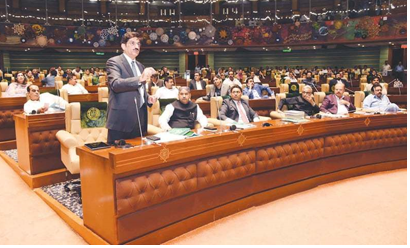آئی این پی ویلتھ پی کے
Shujauddin Qureshi
A wave of euphoria has swept across Sindh’s business community following the presentation of a Rs3,451 billion budget, which includes the scrapping of five long-standing provincial taxes and signals further ease in the sales tax system. The GST on services is collected by the provinces, reports WealthPK.

The business community, especially in Karachi, has long demanded the abolition of provincial taxes such as the professional tax, entertainment duty, drainage cess, cotton fees, and local cess. According to them, these taxes are outdated and burdensome due to an inefficient collection system. With a population exceeding 20 million, Karachi is Pakistan’s largest city and commercial capital.
The abolished fees, often overlapping and difficult to track, have contributed to the perception that Sindh is a tough place to do business. “We want to make Sindh more business-friendly,” said Chief Minister Murad Ali Shah during his budget speech in the Sindh Assembly. The chief minister also holds the finance portfolio.
According to him, the provincial government aims to reduce bureaucratic hurdles, lower compliance costs, and signal its commitment to economic reform. “No doubt, whenever taxation is abolished, it's beneficial for the business community, whether small or large-scale,” said Younus Soomro, a member of the Karachi Chamber of Commerce and Industry, in an interview with WealthPK.
“In my opinion, revenue collection from these local levies was very low, as most of the funds ended up in the personal pockets of excise taxation staff,” Soomro remarked. The Sindh government has not only abolished five taxes but also reduced several other fees to make services more affordable. The mutation fee and the sales certificate fee have been halved from Rs1,000 to Rs500.
The cost of obtaining certified copies has also been slashed by 50 percent. Similarly, fees for solvency certificates and heirship certificates are proposed to be reduced from Rs1,000 to Rs500. The chief minister also announced a major change in the general sales tax system for services. Under the new system, all services will be subject to sales tax unless specifically exempted under certain conditions.
While the standard sales tax rate for most services remains at 13 percent, the chief minister revealed a reduction for certain sectors. Services currently taxed at 10 percent under the Sindh General Sales Tax will see the rate reduced to 8 percent. This move is aimed at providing relief to select industries and encouraging growth in those areas. Additionally, the Finance Bill introduces a significant exemption for small businesses.
Companies with annual sales of less than Rs4 million will no longer be required to pay sales tax. This exemption is intended to support entrepreneurship and ensure small business owners are not overwhelmed by tax burdens. By removing the sales tax requirement for these smaller enterprises, the government hopes to foster a more business-friendly environment, stimulate economic activity, and encourage more individuals to launch their ventures.
These new measures reflect the government’s efforts to strike a balance between revenue collection and the need to promote business growth and protect small entrepreneurs. It has also been proposed that stamp duty on motor third-party insurance be set at just Rs50, making compliance easier and more affordable. Speaking to WealthPK, analyst Naseer Memon said reducing or eliminating taxes can ease the burden on various segments of society.
For instance, ending the professional tax will benefit the salaried middle class, which already shoulders a heavy tax load. However, he cautioned that the real challenge is ensuring this relief reaches the general public. Often, tax cuts disproportionately benefit a few powerful groups rather than the broader population. Business leaders believe the new tax measures could reduce operational costs, attract new investment, and boost profitability for companies operating in the province.
Still, despite the positive reception, concerns remain. Several industry representatives have pointed out that the new budget does not address some of Karachi’s most pressing long-term challenges—such as deteriorating infrastructure, chronic water shortages, and an unreliable power supply—which continue to hamper industrial growth and productivity. Business leaders argue that while tax reforms are crucial, they must be accompanied by improvements in essential services and infrastructure to create a truly supportive environment for businesses.
They urge the government to ensure effective implementation of the new tax policies and to prioritize investment in energy and infrastructure. Without addressing these fundamental issues, they warn, the benefits of tax reforms may be limited. If the government can deliver on both fronts, many believe it can pave the way for sustained economic growth and a more vibrant business climate in Sindh.
Credit: INP-WealthPk


